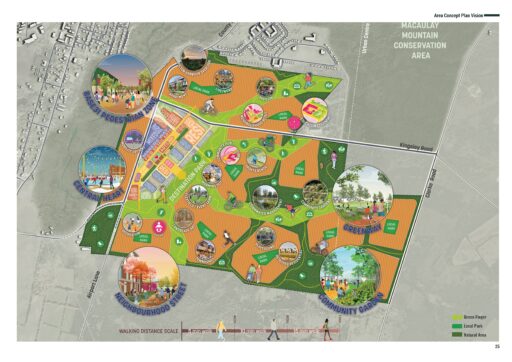On an escarpment in Prince Edward County, Ont. overlooking Picton’s main road sit several rows of one-story, wooden buildings topped with steel roofs coloured a brilliant orange. This grouping of buildings is known as Base31, a reference to the area’s history as a WWII airbase.
Base31 ceased operations as a military base in 1969, transitioning into a business park and airport before being purchased in December 2021 by PEC Community Partners, a consortium of community developers that includes Tercot Communities, DECO Communities, PEC Placemaking, and Rockport Group.
Along with the former airbase, PEC Community Partners also purchased the surrounding 750 acres, which it plans to develop into a mixture of retail, restaurants, work spaces, recreation areas, green spaces, and housing. The plan is to build a mixed-use community appealing to a range of demographics, including first-time homebuyers, retirees, students, and those who work in the community.
In total, the area will feature 7,500 homes—nearly twice the population of Picton—including townhouses, apartments, rental units, and single-family homes. These units will be divided up into several villages all with their own amenities: daycare facilities, playgrounds, retail, restaurants, workspaces, and even spots for seniors’ programs. Each village will be separated by “green fingers,” outdoor space where people can walk or bike, leading towards the former airbase.
 Photo Courtesy of Base31
Photo Courtesy of Base31
Planning is still in early stages, so PEC Community Partners doesn’t have a percentage of how much of the 750 acres the housing development will occupy, but Alexandra De Gasperis, vice president of DECO Communities, says they intend to prioritize green space.
To ensure the development aligns with the priorities of the Prince Edward County community, the developers initiated an engagement campaign with locals, including surveys, workshops, and an idea fair where residents could provide their thoughts on the development.
“The number one thing we heard was housing. We need housing here, and we need housing for everyone. We need worker housing, affordable housing, apartment rental housing, and housing for our parents to age in place,” De Gasperis says.
Much of the development’s housing is intended to meet the needs of the local community, but the group is also hopeful it will attract work-from-home buyers from cities like Toronto and Montreal. “Successful communities are mixed-used and mixed-income, and have a lot of diversity in them,” Tim Jones, the CEO of Base31 and a Picton resident, says.
In an effort to provide this housing as soon as possible, Prince Edward County has applied on behalf of PEC Community Partners to the Community Infrastructure and Housing Accelerator, operated by Ontario’s Ministry of Municipal Affairs and Housing. If approved, the accelerator would allow the development to bypass zoning, site plan, and subdivision approvals, estimated to speed the construction process up by close to a year.
“Over the past 10 to 15 years, there have been delays in getting housing started, which has led to high construction costs, higher land prices, and higher home prices,” De Gasperis says. “The County has worked with us as a municipal partner to expedite some of our approvals through this accelerator.”
In exchange for help expediting the construction process, PEC Community Partners has promised Prince Edward County that five per cent of the development’s units will be designated as affordable housing. It has yet to be determined what this means in terms of real estate prices and types of units, but the Canada Mortgage and Housing Corporation defines affordable housing as housing that costs less than 30 per cent of a household’s before-tax income.
The total development is projected to take 20 to 30 years, with the first village planned for construction near Kingsley Road, one of few main roads into Base31. To improve traffic flow through the development, PEC Community Partners plans to build an integrated road, cycling, and pedestrian network that would connect the former airbase to the surrounding villages. The group is also looking at creating additional road connections to Picton’s main street in an effort to drive traffic between the two commercial areas. And it plans to work with landowners north of the site to figure out viable road connections between Base31 and the surrounding communities.
Once these final planning details have been resolved, PEC Community Partners is optimistic that shovels will be in the ground by mid-2025.
Since taking over, the group has already repurposed some of the airbase’s historical buildings as concert venues, art galleries, outdoor play spaces, and an open-air food and drink market (opening June 1). One of Base31’s biggest draws is the Drill Hall, a 22,000 sq. ft. concert venue that hosted Juno award-winning singer Charlotte Cardin last summer. The group also plans to launch a museum in 2025 honouring the site’s heritage.
Related Story This tucked-away treehouse is a modern take on a childhood dream
Related Story 3 essential spring window tune-ups
Related Story Buy the Way: This family sold their Lake Simcoe cottage and bought one in Muskoka instead